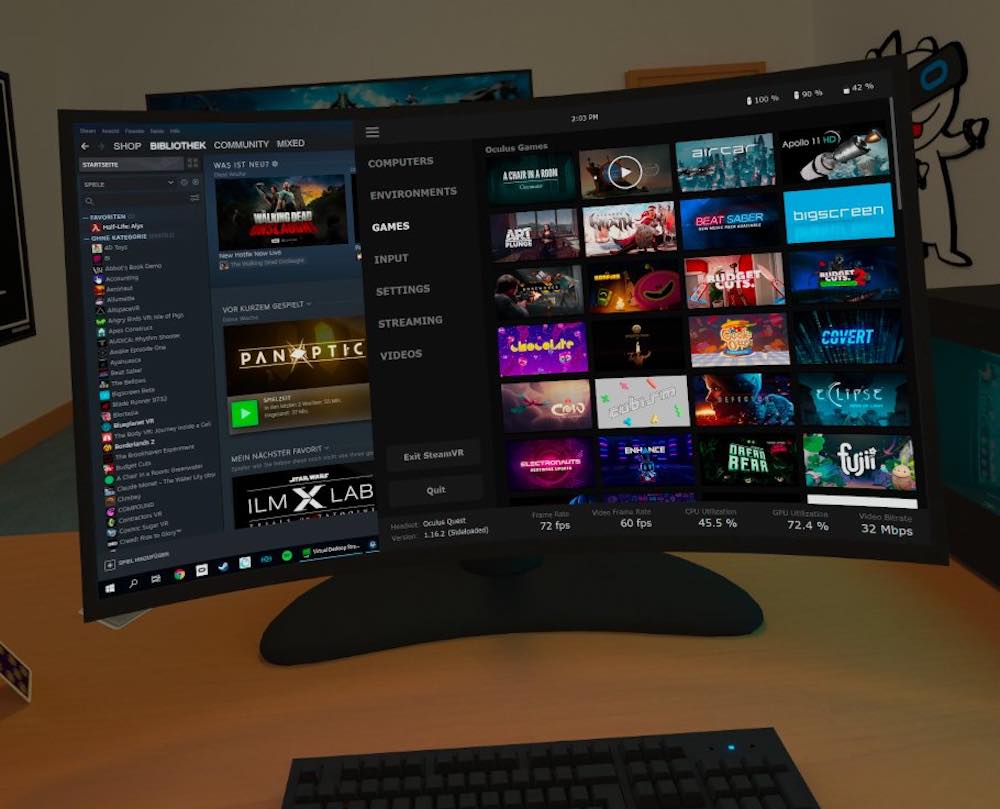
In the US, Facebook is facing a wave of antitrust lawsuits that should also shed light on VR’s business practices. According to the report, the US Department of Justice is currently addressing virtual reality developers who accuse Facebook of abusing its dominant market position.
Facebook Facebook is doing a lot of interesting things today: insiders report that several US federal prosecutors are planning to file lawsuits against Facebook next week. At least 20-30 states should participate in the antitrust lawsuit, CNBC writes.
The Federal Trade Commission( FTC), the federal agency that is responsible for consumer protection, is also due to file charges next week. The focus is on the takeover of Instagram and Whatsapp.
Facebook’s Facebook business activities have long been under investigation by the U.S. Department of Justice, and now it is in talks with developers and manufacturers of virtual reality products who accuse Facebook of unfair competition, Bloomberg reports.
Facebook’s market dominance is growing rapidly
VR market watchers know: Facebook is going to establish a monopoly on virtual reality. Facebook’s Facebook glasses are increasingly dominating the virtual reality market, and with Oculus Quest 2, Facebook has unveiled a self-contained device that should have a long-term impact on the virtual reality industry. Strong competition is not expected: the largest competitor Sony recently announced a temporary withdrawal from the VR market.
Facebook Facebook Facebook’s VR ambitions are both a blessing and a curse for developers: on the one hand, Facebook, as the most important driver of virtual reality, has significantly expanded the market, so that some developers are already making good money on their games and apps, on the other hand, Facebook’s VR platform is now so important as a source of revenue that it is becoming difficult for developers to make a profit outside of the Oculus store. This is how Facebook gains more power over the market and developers.

At the center of the antitrust lawsuits is Facebook’s aggressive business practices: competitors are either captured or copied until they are pushed out of the market.
Three developers and a manufacturer of virtual reality glasses accuse Facebook of abusing its dominant position in the virtual reality market and applying these strategies to the VR market. It is alleged that Facebook is stealing ideas, pushing rival VR apps out of the Oculus store, and dropping prices on VR devices.
Founder leaves his own startup under pressure
Cix Liv, co-founder of the startupYur, is one of these three developers. His company has released a fitness tracker for virtual reality glasses. According to him, the startup spent several months meeting the requirements of the Facebook store, but in the end was refused. Currently, the app is only available on other VR platforms, such as Steam and Sidequest.
Liv accuses Facebook of making the fitness tracker unusable due to a software update and launching its own solution — the Oculus Move fitness tracker. “Facebook is eating the industry alive,” Liv told Bloomberg. “It kills any app that could start competing.”
The company’s founder is said to have been kicked out of his own startup after he made allegations against Facebook on Twitter. Facebook’s Facebook investment company, VR Venture Reality Fund, reportedly pressured him not to criticize Facebook because they hoped that in the future, Facebook might absorb Yur or other startups that the company had invested in.
Facebook forces developers to remove feature
Guy Godin had a similar experience. The developer of the popular Virtual Desktop VR app is accusing Facebook of stealing the idea of accessing the virtual desktop and releasing it for free under the same name for its own PC VR platform.
But that’s not all: in the summer of 2019, Godin released an update for Virtual Desktop, which provides wireless streaming of computer VR games in Oculus Quest. Facebook forced the developer to remove the feature, citing quality issues. Since 90 percent of its revenue comes from the Oculus store, Godin complied with the request. Since then, the streaming feature must be downloaded from an alternative platform.
Godin believes that Facebook wanted to remove this feature because the company is working on its own free streaming solution over Wi-Fi . “They want to control everything,” Godin tells Bloomberg. “When there is only one company, it will be difficult for a developer to survive.”

Fear of Facebook’s Market Power
Another Facebook critic is Bigscreen CEO Darshan Shankar. Bigscreen is one of the most popular VR apps that lets you watch videos and movies together in virtual rooms.
The startup has been offering film screenings in virtual cinemas since 2018. Since the startup has to pay studios high fees for movie rentals, and Facebook requires another 30 percent of sales, Bigscreen suffers losses with literally every show. Shankar claims that he wanted to negotiate with Facebook, but to no avail.
A few years ago, he received takeover offers from Facebook, which increasingly turned into threats. “They told me to join them because they will create the same thing and destroy us,” Shankar wrote on Twitter.
Facebook Facebook Developer:”Every VR developer is afraid to talk about Facebook, because we fear that Facebook will do us even more harm and make survival even more difficult.”
Price dumping puts competitors at a disadvantage
Paris-based startup Lynx is developing self-contained mixed reality glasses designed for companies and using components similar to Oculus Quest 2. CEO and founder Stan Larroch believes that Facebook is generously subsidizing virtual reality glasses, and estimates losses of $ 50 per device. Facebook wants to usurp the virtual reality market with unbeatable prices. The price tag doesn’t allow smaller manufacturers to compete with Facebook.
“The message is: we are Facebook, and we don’t care if we make money. We will flood the market, and soon virtual reality will become a Facebook reality, ” Larroc says.
Now the critics are coming together and organizing. In September, 40 virtual reality developers met and discussed an open letter to Facebook calling for more transparency about the store’s rules and additional benefits for developers. The group also wants to partner with an organization that publicly represents their rights and views.








